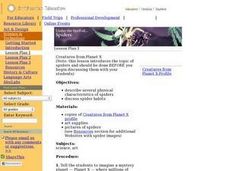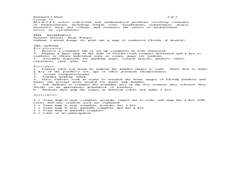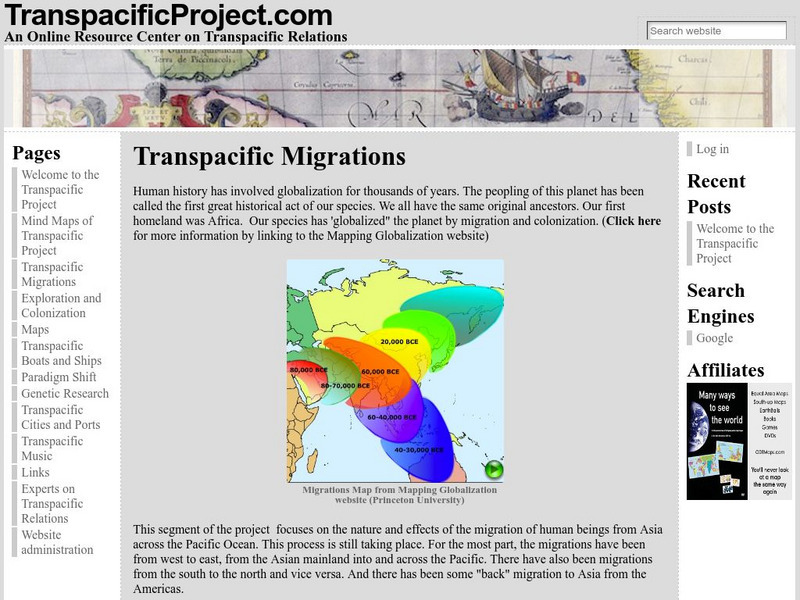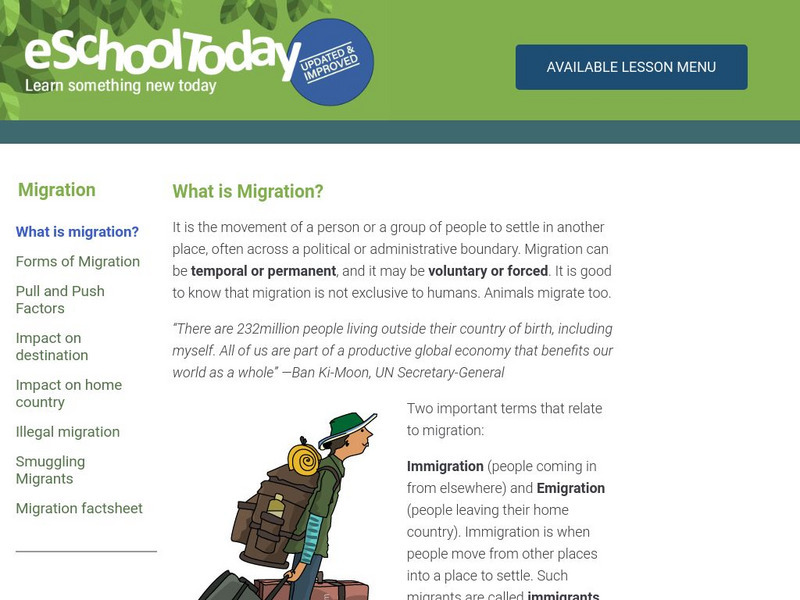Curated OER
How Are Boundaries Made, Kept, Broken?
Students perform raps and analyze issues among the rich and poor. They explore how countries are labeled as "third world" and "first world." They create a dialectical journal and examine the country of Nigeria through the reading of...
Curated OER
How Are Boundaries Made, Kept, Broken?
Students examine the works of Noam Chomsky. They collaborate in small groups to read and identify vocabulary words and historical questions. They answer their questions and role-play as emissaries to locate remaining answers. They...
Curated OER
How Was the Inside vs. Outside Paradigm Created?
Tenth graders write notes from a teacher lecture on Slavery and Exploitation. They review process for notetaking, symbols and abbreviations. They read three web articles about slavery and create a rubric for evaluating the quality of a...
Curated OER
Spy on a Spider
Students view slides or live specimens to name and describe the distinguishing features of groups of arthropods, especially spiders and insects. They complete worksheets, observe webs and then search for and record where spiders can be...
Curated OER
Creatures from Planet X: Spiders
Students are given a description of some fascinating animals from "Planet X". They follow the descriptions given to illustrate one of these animals paying careful attention to introduced vocabulary such as 'appendages', 'receptors', and...
Curated OER
Facts, Feats and Folklore: Spiders
Students review and discuss a variety of sayings, folklore and superstitions about spiders. They discuss this information and choose either an interesting fact or appealing foklore tradition to illustrate.
Curated OER
People and Parks in the U.S.A.
Fifth graders explore the National Parks in the United States. After locating specified states, 5th graders predict which states have the most National Parks. Given the population of each state, students determine the average acre per...
Curated OER
Letters from the Japanese American Internment
Learners make deductions about life in an internment camp by reading and comparing letters written to Clara Breed. Along the way, they consider the advantages of looking at a historical event from the multiple points of view of...
Curated OER
Digital Picture Books
Second graders create digital picture books reflecting their experiences during the school year on field trips and various classroom activities. Using digital pictures taken during the year, they write captions for each picture and...
Curated OER
Community Quilt
Second graders use prior knowledge about the community to create a quilt. They use complete sentences to explain their block and also use oral language skills to tell about their caption for their quilt piece.
Curated OER
Winer Survival
Students study how animals need water, food, shelter, and space to survive. They also study what animals need to survive in the winter. They play the part of animals and winter "threats" in a game of tag to reinforce concepts.
Curated OER
Loggerhead Nest Management Program
Students identify the sea turtle management documentary and complete an activity for each slide. They plot the location of nests laid on the island they patrol and discuss their rationale for management decisions. Finally, students...
Curated OER
Mussel Movements
Students consider the impact of invasive species on local environments. In this ecology lesson, watch the video, Arizona Wildlife Views, which focuses on invasive species. Students develop vocabulary, relate to meaningful comprehension...
Curated OER
Home on the Range
Students use maps and mathematics to determine the appropriate panther population in a given area. In this Florida ecology lesson, students research the area requirements of male and female panther and use a map to help calculate how...
Howard Hughes Medical Institute
Hhmi: Bio Interactive: Using Dna to Trace Human Migration
A slideshow tracing human migration to show that "all living humans originated from populations of ancestors who migrated out of Africa less than 100,000 years ago. Learn how scientists have used genetic markers to trace the migration...
PBS
Pbs: Frontline: Economic Factors Influence Human Migration on u.s. Border
Explore the reasons people migrate to other towns, regions, or in some cases countries. This learning module investigates the economic pull for people along the Mexican border to cross into the United States.
Khan Academy
Khan Academy: Key Concepts: Human Migration
The resource from Khan Academy provides practice questions for a high school world history course. This section assesses students' knowledge of human migration.
Khan Academy
Khan Academy: Focus on Causation: Human Migration
The resource from Khan Academy provides practice questions for a high school world history course. This section assesses students' knowledge of causation of human migration.
Khan Academy
Khan Academy: Activity: Human Migration Patterns
Use this activity to figure out where the first humans lived. This activity requires students to read clues and use their understanding of the clues to create a map to give them a visual representation of early humans movements.
Stanford University
Stanford University: Scientists Use Dna Fragments to Trace Migration
Scientists piece together the puzzle of human migration out of Africa using DNA research. (Published in 2003)
Virginia Tech
Digital History Reader: Can Humans Control the Natural World?
The course of industrialization and migration of society forced a shift within the natural world. Through context, writing assignments, reports, articles, visual materials, and bibliographical resources this unit dives into the question,...
The Henry Ford
Early 20th Century Migration: Transportation: Past, Present and Future [Pdf]
A teacher's guide and unit plan that explores the migration of people from within and to the United States in the early 20th century up to the present day, many of them to work in the automobile factories in the northern US. Additional...
Other
Trans Pacific Project: Transpacific Migrations
What an incredible resource that looks at Transpacific migrations peopling the Western Hemisphere, the Pacific islands, and the Chinese diaspora. Included is information about genetic research that traces DNA patterns across the world....
eSchool Today
E School Today: Your Cool Facts and Tips on Migration
There are 232 million people living outside their country of birth. Learn about the reasons why people migrate from their home country and the impact, positive and negative, migration has on countries. Additionally, learn about illegal...
Other popular searches
- Human Migration Patterns
- Early Human Migration
- Human Migration Maps
- Math Human Migration
- Ancient Human Migration
- Human Migration Geography
- Mapping Human Migration
- Human Migration From Ireland
- Human Migration Africa
- Early Human Migration Maps
- Usa Human Migration
- Early Human Migration Routes
























